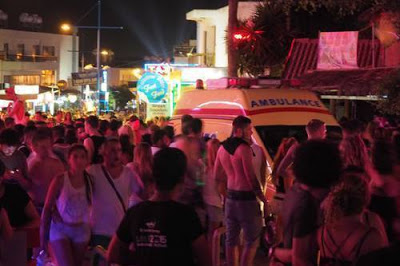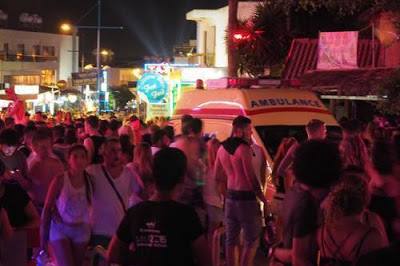Read the report:
When in the summer of 2000 Manolis Kalatzis and I visited Ayia Napa and recorded the deviations and competitions of sexual content in public view, we photographed the use of hallucinogenic pills in the streets, we highlighted the dirt, the informal economy and the extremely low level of resort, we could not imagine how much worse things could have been 15 years later.
As the businessmen we spoke with report, "after the reports of" Politis ", which showed the decline, the then mayor tried to put order". It may not have needed any intervention, since after the reportage and the descent of BBC journalists who recorded step by step the disintegration of Ayia Napa's nightlife, the issue regulated itself for a few years. The tour operators then tried to channel the young Britons they brought to Rhodes and Malta to release their repressed instincts.
Marginal groups
"The reportage helped quality tourists come. We chased the savory for 3-4 years but in recent years they have started to come back again ". It is obvious that what they found in Ayia Napa, the complete lack of surveillance and lawlessness, they did not find elsewhere, as the businessmen describe to us. This is why in recent years tour operators have revived their interest in Cyprus, channeling to Ayia Napa for tourism marginal groups of young people, mainly from England and Russia, who want to spend their holidays without any inconvenience from the law.
No policing
"They come here because they know there is no policing and they do whatever they want." Many of these young people - as businessmen in the area who want quality tourism point out - make money working as barksmen or peddlers, even knocking on hotel room doors to sell junk. "They come for two weeks, take their vacations for free and take a lot of money with them." You see them on the streets. They approach you, they tell you to enter the store. They have a way of convincing their peers.
Unfortunately, for entrepreneurs who want to have quality but also to attract tourists with high economic status, Ayia Napa has not managed all these years to develop into a quality tourist destination. Noisy because one of the things it sells is night life, but that can be tolerated and especially chosen by a person who wants to mess up but in the context of the human, the normal.
"We do not accept this cheap product. We can do much better. Now you know the Cypriots do not come either, because they are annoyed to see all this, who leave money in Ayia Napa. A few Cypriots, mainly from Nicosia, come in mid-August and are the ones who save us financially. But know that the knot reached the scallop. We have been working at our expense for the last two years ".
They claim that the urban environment and anarchic development degrade Ayia Napa tourism. "There was never a master plan to see how we want Ayia Napa to develop. And otherwise tourism is what lives us as an economy "…
School of barking
Entrepreneurs have a lot in common with the mayor and city council members who allow beach parties to be organized. "The mayor is promoting savoura. They bring the roles that destroy our tourism ", they point out. They wonder if for the beach parties that are organized one pays rent, they pay VAT, there is control and security. "If every beach party involves 3.000 young people for 55 euros each for their food, drink and music, think about how much tax-free money they make. Do you know how many barkers there are to advertise beach parties? They get about 10 euros for each customer they get at beach parties. They even did a school of barkers here and they are taught the tricks. "All of this is doing enormous damage to our tourism product," said the businessmen.
They make it clear that "the Ayia Napa mafia is not involved in all this. "Some just have political backs and so the municipal authorities and the police tolerate them."
Fear and terror
The young people who mainly flood Ayia Napa in July, aged 16-22, with the drinks they give them reach states of hyperstimulation, are in delirium and sometimes have if not violent behaviors at least provocative. "It is fear and terror and the law is not enforced," said a businessman. And another adds: "For me the worst is when they return from the beach parties and it is melting intoxication from the bombs and they go around naked and go around with the pigs naked. They honestly do not understand anything "… Man describes the absolute disgrace.
Silent tolerance
Through all this, Ayia Napa is sinking more and more into ruin and the sad thing is that the locals - businessmen, workers, local authorities and residents - except for a few, those who told us about the disintegration in the once picturesque village, have surrendered to Their "fate". In the fate that wants them to bow their heads in this scheming and inhuman situation for two or three months in the summer, so that they can make a living the rest of the year.
Two taxi drivers in the square near the square also talked about this aspect of our lives. Good people, you could see it in their eyes. Eyes that have seen a lot obviously, but that are afraid to convey the images.
So everyone is comfortable with tacit tolerance. That gets their hands dirty even though they work as honestly as they can.
"We have no choice," they tell us. "To understand the situation we have reached, there are 3-4 private clinics in Ayia Napa. You saw the ambulances waiting in the square.
Tourists fight and slaughter in the square, throw bottles, and wait every night to pick them up. They come here and they relax unfortunately and obviously they have a better time than Ibiza and Mallorca because there is no law here. They drive the four-wheelers and enter the one-way streets, closing the roads. They are dangerous "…
Source: Citizen

